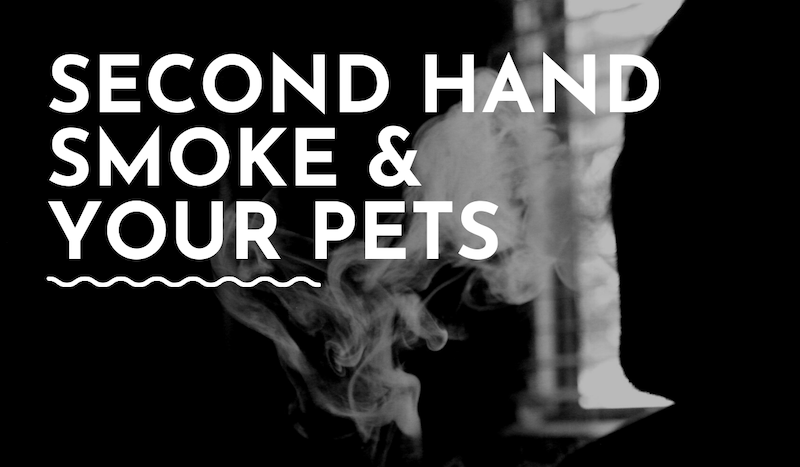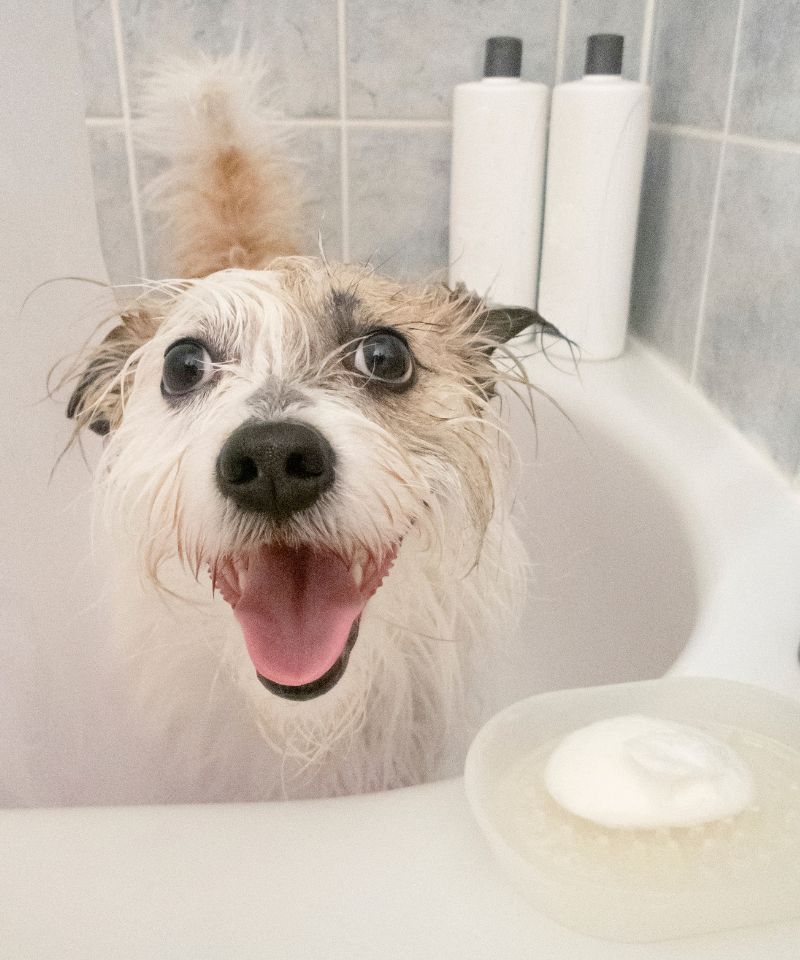Secondhand smoke is a well-known health hazard for humans; however, living in a home with a smoker can also put dogs, cats, and birds at risk of a wide range of health problems, from respiratory issues to cancer.
According to several studies, pets exposed to secondhand smoke are more likely to develop lung cancer, lymphoma, and mouth cancer.
Therefore, in this article, we will discuss the dangers of secondhand smoke for pets and recommend how to protect your beloved companions from a cloud of health hazards.

What is Secondhand smoke?
Secondhand smoke, also known as passive smoke or environmental tobacco smoke, is the combination of smoke exhaled by a smoker and the smoke that comes from the burning end of a cigarette, cigar, or pipe.
It contains a mixture of over 7,000 chemicals, many of which are toxic and can cause cancer.
Can Secondhand Smoke Harm Pets?
Pets who are exposed to secondhand smoke can inhale the harmful substances present in the environment, which may lead to various health issues such as respiratory infections, heart disease, and cancer.
Pets can be particularly vulnerable to the effects of secondhand smoke because they spend more time indoors and have smaller respiratory systems than humans.
This means they are exposed to higher concentrations of smoke than humans in the same room while also having a limited ability to process and eliminate toxins, leading to an increased risk of developing severe health conditions or problems such as eye infections and skin irritation.
It is important to note not only does secondhand smoke affect pets when they are in the same room as smokers, but it can also affect them when they are in rooms where smoking has occurred in the past.
This is because the harmful chemicals in smoke can linger in the air and on surfaces for long periods.
Therefore, pet owners should take steps to protect their pets from secondhand smoke by avoiding smoking indoors and by asking guests to smoke outside.
Additionally, pet owners who smoke should consider quitting for the health of their pets as well as themselves.

Which Pets Are Most at Risk?
Dogs, cats, and birds are the most vulnerable to the harmful effects of secondhand smoke.
However, any pet sharing a living space with a smoker is at risk of developing health problems due to secondhand smoke exposure.
What are the Symptoms of Secondhand Smoke Exposure in Pets?
Symptoms of secondhand smoke exposure in pets can vary depending on the type of pet and the severity of the exposure.
Some common symptoms include:
- Coughing and wheezing.
- Sneezing.
- Difficulty breathing.
- Rapid blinking and tearing up due to eye irritation.
- Crusts, infections, and hair loss due to skin irritation.
- Lethargy.
- Loss of appetite.
- Weight loss.
If you notice any of these symptoms in your pet, it is essential to take them to a veterinarian as soon as possible.
Early detection and treatment can prevent further health problems and improve your pet’s quality of life.
What are the Long-Term Effects of Secondhand Smoke Exposure in Pets?
The long-term effects of secondhand smoke on pets can be pretty severe and can lead to serious health problems.
Here are some of the most common long-term effects of secondhand smoke exposure in pets.
Respiratory Problems
Pets exposed to secondhand smoke can develop respiratory problems such as coughing, wheezing, and difficulty breathing.
Long-term exposure to secondhand smoke can lead to chronic bronchitis, pneumonia, and other respiratory diseases.
Cancer
Pets exposed to secondhand smoke are at a higher risk of developing cancer.
Dogs exposed to secondhand smoke have been shown to be at an increased risk of developing lung cancer, nasal cancer, and sinus cancer, while cats exposed to secondhand smoke have a higher risk of developing lymphoma and oral cancer due to the harmful substances in the air sticking to their coat, which they ingest while grooming.
Eye and Skin Irritation
Secondhand smoke exposure can cause eye and skin irritation in pets.
Pets exposed to secondhand smoke may develop red, itchy, and watery eyes.
They may also develop skin rashes and other skin irritations, which can lead to loss of fur and visible and painful concerns such as crusts and skin infections.
Other Health Problems
Pets constantly exposed to secondhand smoke may experience a decrease in appetite and energy levels due to the harmful impact of inhaling toxic substances.
These substances can cause respiratory issues, making it difficult for pets to breathe comfortably, which may lead to a reduced interest in physical activities.
Additionally, the buildup of toxins in their bodies can affect their overall health, leading to fatigue and lethargy.
This diminished vitality can also result in a loss of appetite, as the discomfort from smoke-related health issues can make eating less appealing.
Over time, these factors can significantly impact a pet’s quality of life, underlining the importance of minimizing their exposure to secondhand smoke.
How to Protect Your Pets from Secondhand Smoke?

To protect your furry friends from the dangers of secondhand smoke, there are a few things you can do.
Create a Smoke-free Environment for Your Pets
Creating a smoke-free environment is the best way to protect your pets from secondhand smoke.
This means not smoking in your home or car and ensuring anyone visiting your home does not smoke around your pets.
If you must smoke, do it outside and away from your pets.
You can also use air purifiers and open windows to help remove smoke from your home.
Keep in mind these methods are not foolproof and may not completely eliminate the risks of secondhand smoke.
Educate Others About the Dangers of Secondhand Smoke to Pets
It’s important to also educate others about the dangers of secondhand smoke to pets.
This includes family members, friends, and even strangers who may be smoking near your pets in public areas.
You can start by explaining the risks of secondhand smoke to pets and how it can harm their health.
You can also encourage smokers to quit smoking or at least smoke away from your pets.
Use Air Purifiers
High-quality air purifiers with HEPA filters can help remove smoke particles from the air. Therefore, as these devices can offer additional protection by improving indoor air quality, consider investing in one for your home and pet’s health.
Ventilate Your Home
Regularly open windows and doors to increase ventilation.
Good airflow can help disperse smoke particles more quickly, reducing their impact on your indoor environment and decreasing your pet’s risk of developing health conditions.
Regular Vet Check-ups for Your Pets
Regular vet check-ups are important for all pets, but especially for those who may be exposed to secondhand smoke.
Your vet can monitor your pet’s health and check for any signs of respiratory problems or other health issues that may be related to secondhand smoke.
During these check-ups, be sure to mention any concerns you have about your pet’s exposure to secondhand smoke.
Your vet can offer advice on how to further protect your pet and keep them healthy.
By creating a smoke-free environment, educating others, and scheduling regular vet check-ups, you can help protect your pets from the harmful effects of secondhand smoke.